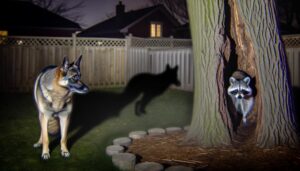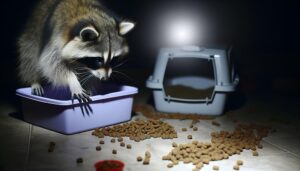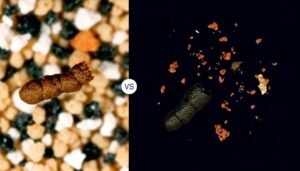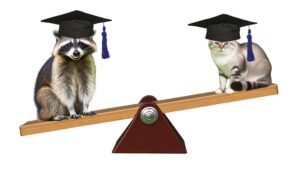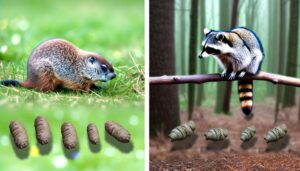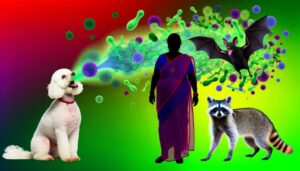Does Dog Poop Attract Raccoons?
Yes, dog feces can indeed attract raccoons. Raccoons are opportunistic omnivores with a sharp sense of smell, allowing them to locate unconventional food sources.
Despite their wide-ranging diet, high-energy foods like dog feces, rich in undigested particles, are particularly appealing, especially in times of scarcity. Urban environments commonly witness these scavenging behaviors, increasing raccoons' pest status.
Close encounters with raccoons bear risks due to diseases they carry, affecting both pets and humans. A more in-depth look into raccoon behavior, potential threats, and preventive measures could greatly contribute to effective local wildlife management strategies.
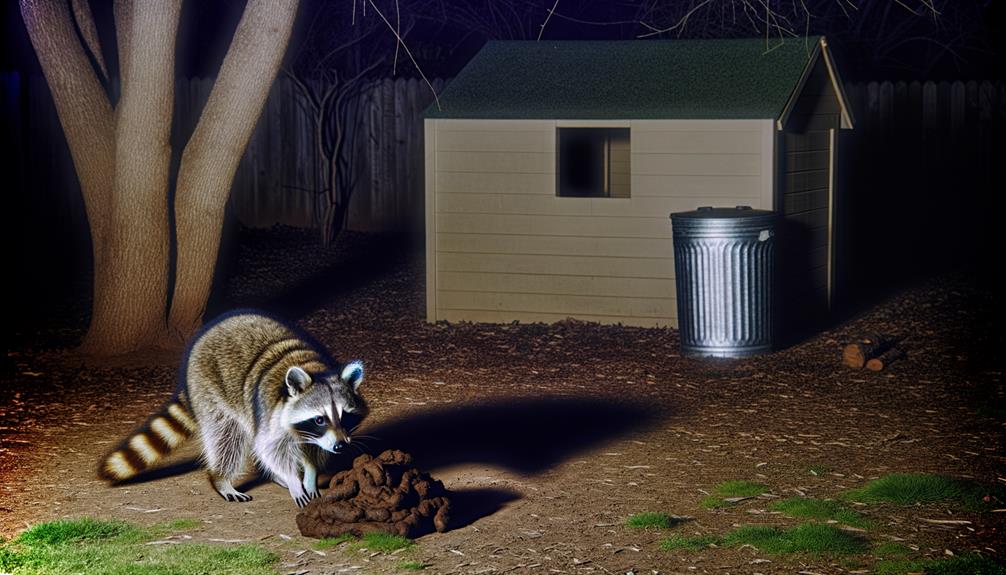
Key Takeaways
- Raccoons, being omnivores, can find dog feces a nutrient-rich food source especially in times of scarcity.
- The presence of undigested food in dog feces can make it an attractive target for raccoons.
- Raccoons' acute sense of smell facilitates their attraction to dog feces.
- Attracting raccoons with dog feces can lead to increased disease risks to dogs, including canine distemper and parasitic infections.
- Preventive measures include proper dog waste management, cleaning potentially attractive areas, and using deterrents to avoid attracting raccoons.
Understanding Raccoon Behavior
A thorough understanding of raccoon behavior, particularly their scavenging habits and attraction to various food sources, is pivotal in grasping why dog feces might be attracting these nocturnal creatures. Raccoons, by nature, are opportunistic feeders with an omnivorous diet, making them prone to explore different sources of nourishment.
Dog feces, being a byproduct of canine digestion, contains residual food particles, hence acting as an unexpected yet viable food source for raccoons. Their acute sense of smell allows them to detect and locate these unconventional food sources from great distances.
This inherent behavior, coupled with an adaptable diet, explains the puzzling attraction raccoons have towards dog feces, marking a significant point of interaction between domestic canine environments and these wild creatures.
Raccoons' Dietary Habits
Raccoons are known for their omnivorous diet, consuming a diverse range of foods from plants to small animals, and even human waste. Their scavenging behavior is a critical aspect of their survival, often leading them to populated areas in search of sustenance.
The impact of urbanization on these creatures will be examined, particularly in relation to their increasing reliance on unconventional food sources such as dog feces.
Raccoons' Omnivorous Eating Habits
Characterized by an insatiable appetite and a remarkably adaptable dietary regimen, raccoons are known to consume a wide variety of foods, demonstrating their omnivorous eating habits. Their diet ranges from small mammals and birds to fruits, vegetables, and nuts.
In urban areas, they often forage in garbage bins, demonstrating their adaptability and opportunistic feeding behavior. Raccoons are also known to consume invertebrates such as worms, insects, and crayfish, an essential part of their diet providing necessary proteins.
They have even been observed eating carrion when food sources are scarce. Notably, raccoons exhibit a peculiar behavior of washing their food in water before consumption, which is believed to enhance their tactile experience of food.
Role of Scavenging
Building on their opportunistic feeding behavior, the act of scavenging plays a significant role in the dietary habits of raccoons, particularly in urban environments. As nocturnal creatures, raccoons are adept at locating food sources under the cover of darkness. Their acute sense of smell aids in detecting edible items from trash bins, compost heaps, and other waste deposits.
Scavenging from these venues allows raccoons to consume a wide variety of food, including fruits, plants, insects, small rodents and yes, even dog feces. The protein-rich nature of dog feces might be particularly appealing to raccoons. This scavenging behavior is an adaptive trait that enables raccoons to survive and thrive in diverse environments, expanding their dietary reach beyond natural food sources.
Impact of Urbanization
Urbanization has significantly influenced raccoon dietary habits. The abundance of waste disposal sites and easily accessible food in urban areas has led raccoons to shift from traditional foraging to opportunistic scavenging. This change is driven by the availability of high-caloric food waste, including dog poop, in urban environments. Consequently, raccoon populations have increased in urban areas, exacerbating their pest status. Additionally, the higher prevalence of disease pathogens in densely populated areas poses risks to both raccoons and humans. The impact of urbanization on raccoon dietary habits is complex and multifaceted, highlighting the need for further scientific investigation.
The Attraction to Dog Poop
Understanding the attraction of raccoons to dog excrement necessitates an examination of their dietary preferences and scavenging habits.
This omnivorous species exhibits opportunistic feeding behavior, often influenced by the abundance and accessibility of food sources.
The discovery of dog feces in urban and suburban environments can provide an easily obtained, nutrient-rich food source for raccoons, thereby explaining their attraction.
Raccoons' Diet Preferences
What, one may ask, draws raccoons towards dog feces in their quest for sustenance?
Raccoons are omnivorous creatures, their diet encompasses a vast buffet of food items, both plant and animal-based. They are opportunistic feeders, which means they will consume whatever is easily accessible.
Their diet can include fruits, nuts, insects, rodents, eggs, and even garbage or roadkill. In the wild, raccoons display a preference for high-energy foods rich in fats and sugars, which is why they are often seen raiding trash cans.
Dog feces, while not a primary food choice, can be a source of nutrition in situations of food scarcity. It contains undigested food particles along with certain nutrients, hence attracting raccoons when other food sources are unavailable.
Dog Poop: Raccoons' Attraction
The predilection of raccoons towards dog feces is largely a consequence of their broad dietary habits and survival instincts. Raccoons, being omnivores, tend to seek out a wide range of food sources, and dog feces, replete with undigested food particles, becomes an easy target.
This attraction can be attributed to:
- The availability of nutrients in dog feces, which raccoons can utilize for their energy needs.
- The ease of access, as dog feces are often left unattended in yards.
- The olfactory cues in dog feces, which attract raccoons due to their strong sense of smell.
- The survival instinct of raccoons, which prompts them to eat whatever is available, including dog feces.
This behavior, however, raises significant health concerns for both raccoons and dogs.
Health Risks for Dogs
As raccoons are drawn to yards by dog feces, it's crucial to consider the potential health risks these creatures pose to our canine companions. Raccoons carry a variety of diseases, most notably canine distemper and rabies, which present serious threats to dogs.
Canine distemper, a viral illness, can result in severe health complications such as respiratory, gastrointestinal, and neurological issues. Rabies, although less common, can be fatal when transmitted.
Raccoons may also harbor parasites like roundworms which, if ingested through feces by dogs, can cause harm. This highlights the importance of maintaining a clean yard free of feces, not just for aesthetics, but for the health and safety of our pets.
Potential Dangers to Humans
Not only do these raccoons pose a risk to our furry friends, but they also present a range of potential dangers to humans as well. Raccoons are known carriers of various diseases, some of which can have serious implications for human health.
Here are four significant health risks that raccoons pose to humans:
- *Rabies:* This is a deadly disease transmitted through the saliva of an infected animal. Raccoons are one of the primary wild carriers of rabies in the U.S.
- *Leptospirosis:* People can become infected with this bacterial disease through contact with urine from infected animals.
- *Raccoon Roundworm:* This parasitic worm can cause severe neurological problems if humans accidentally ingest or inhale eggs from raccoon feces.
- *Giardiasis:* Raccoons often carry this parasite, which can cause diarrhea, nausea, and stomach cramps in humans.
Preventing Raccoon Visits
So, how can we deter these nocturnal visitors and greatly decrease the risk of raccoon-related health hazards? Preventing raccoon visits involves maintaining a clean environment, eliminating food sources, and implementing deterrent strategies.
Let's illustrate these strategies in the following table:
| Strategy | Description | Effectiveness |
|---|---|---|
| Clean environment | Regularly clean areas raccoons may be attracted to, including yards, patios, and basements | Highly effective |
| Eliminate food sources | Secure trash cans, clean grills, and remove pet food from outside | Highly effective |
| Deterrents | Use commercial repellents, motion-activated sprinklers, or noise-making devices | Variable effectiveness |
Adherence to these strategies can significantly reduce the likelihood of raccoon visits, thereby safeguarding your health and that of your pets. Remember, maintaining a raccoon-free environment is a continuous process, not a one-time effort.
Proper Dog Waste Management
Turning our attention to a significant aspect of maintaining a clean environment, it becomes imperative to discuss proper dog waste management. A responsible approach to this issue not only promotes public health but also helps to keep our surroundings free from unwanted wildlife intrusions.
Effective dog waste management revolves around a few key practices:
- Prompt collection and disposal of dog feces to prevent the accumulation and spread of harmful pathogens.
- Utilization of biodegradable bags for waste disposal to reduce environmental impact.
- Regular cleaning and disinfection of pet areas to maintain hygiene standards.
- Educating other pet owners about the importance of proper waste disposal to foster a community-wide commitment to cleanliness.
Incorporating these practices can help us enjoy our freedom while coexisting harmoniously with nature.
Effective Raccoon Deterrents
Implementing effective raccoon deterrents plays a noteworthy role in managing urban wildlife and preventing potential health risks associated with their presence. Practical strategies include the deployment of repellents, such as capsaicin, a spicy compound that deters raccoons due to their sensitive olfactory receptors.
Equipping your space with motion-activated sprinklers or lights also helps as raccoons are nocturnal, and sudden light or water can scare them away.
A less intrusive method includes altering the environment to make it less attractive to raccoons. Regularly cleaning potential food sources like grills and trash cans, and securing lids can notably reduce raccoon visits.
Identifying and sealing potential den sites like hollow trees and under-deck spaces helps maintain a raccoon-free environment.
Role of Local Wildlife Control
Often overlooked, local wildlife control agencies serve an essential role in managing raccoon populations and mitigating associated risks within urban communities. They control the population growth of raccoons by implementing strategies that are sensitive to the ecosystem yet effective. They also educate the community on ways to avoid attracting raccoons.
Key functions of these agencies include:
- Implementing humane trapping and relocation programs.
- Conducting regular surveillance for raccoon activity.
- Educating residents on the significance of maintaining clean surroundings.
- Collaborating with other organizations for wildlife control efforts.
Conclusion
To sum up, raccoons, driven by their omnivorous diet, are attracted to dog feces, posing potential health risks to both dogs and humans.
The implementation of proper dog waste management, along with effective raccoon deterrents, is essential in preventing raccoon visits.
Maintenance of these practices, along with the support of local wildlife control, can guarantee a harmonious coexistence between humans, their pet dogs, and wildlife, thereby safeguarding public health and the local ecosystem.

